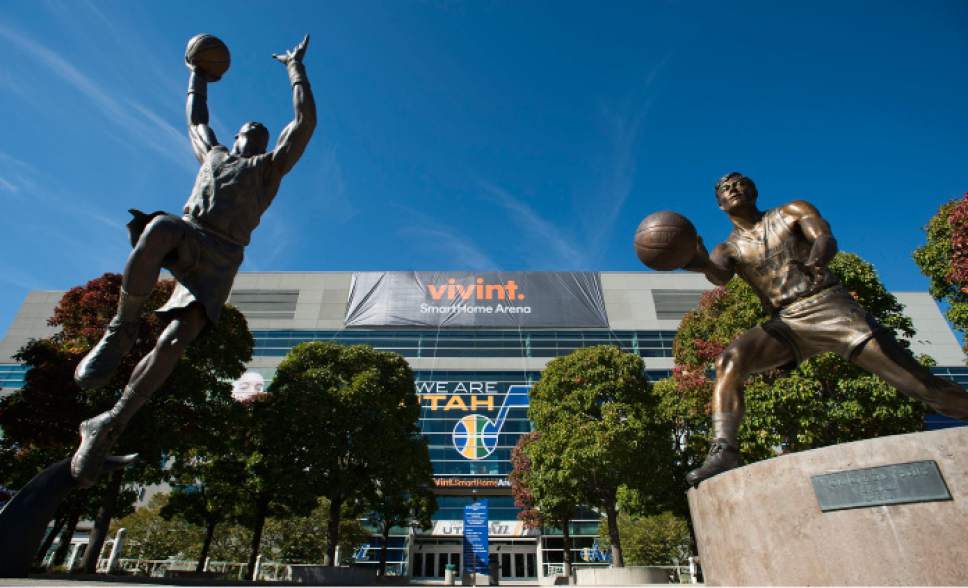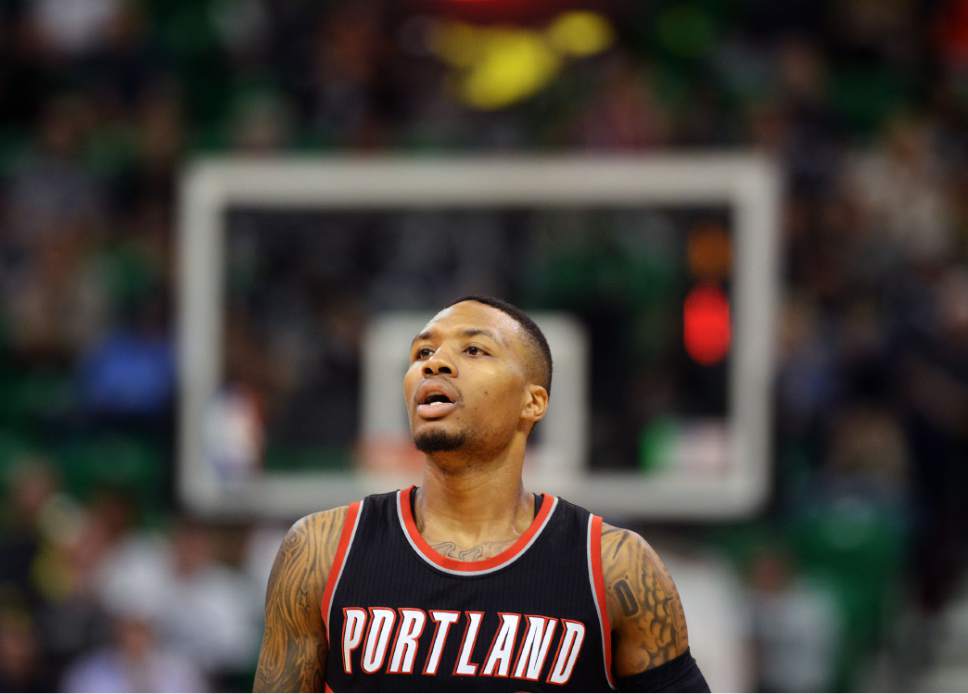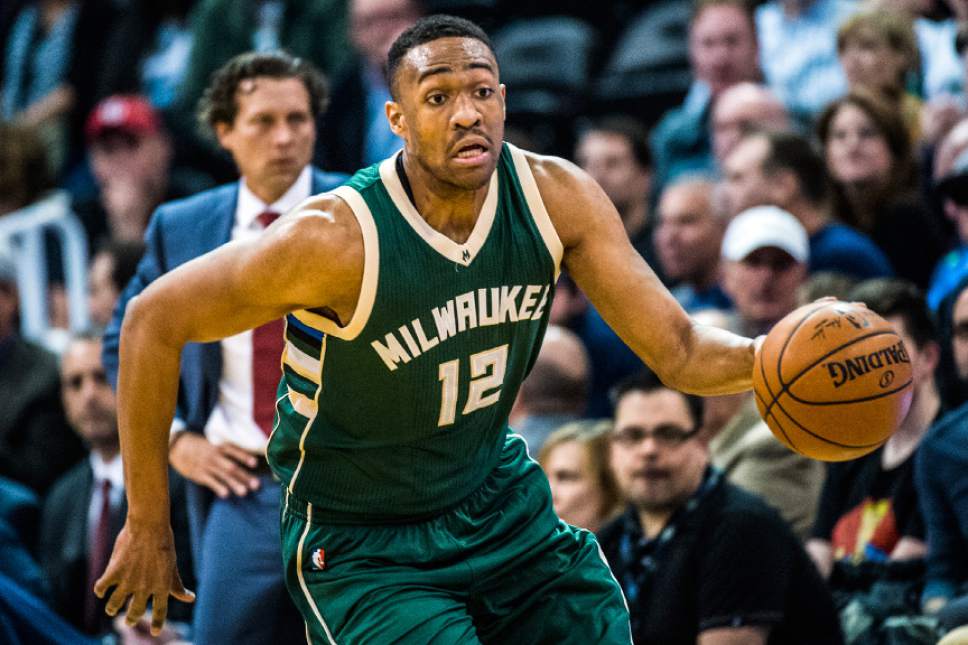This is an archived article that was published on sltrib.com in 2017, and information in the article may be outdated. It is provided only for personal research purposes and may not be reprinted.
He met with his teammates, considered up-and-comers and his friends to boot, with a coach who had helped turn him into an All-Star, and with the owner of the franchise that drafted him seven years earlier.
"After that meeting with them," Gordon Hayward said, "it [was] a feeling of, 'How could I ever leave the Jazz?'"
And, yet, he did. Hayward chalked up his decision to sign with the Celtics to the "instant familiarity" he felt with coach Brad Stevens — and to his feelings about the city of Boston.
"There was just something different about Boston, different about being a Celtic. It was just a special feeling," he said. "… That ultimately won me over."
A year after Kevin Durant's departure from Oklahoma City, another major free agent had said goodbye to a small-market club, opting for greener — and perhaps bigger — pastures elsewhere. But even as the Utah Jazz pick up the pieces in the wake of Hayward's exit, team officials in Salt Lake City insist they are not at a disadvantage when it comes to competing for talent in the NBA landscape.
"No. I think this is a uniquely individual situation," general manager Dennis Lindsey said earlier this month. "We're comfortable with who we are and what we have to offer. We love the state, the organization. Our current players under contract love it here. If that's the narrative, we'll fight that narrative tooth and nail and then we'll change it."
Hayward's decision to leave Utah, however, has certainly prompted another round of discussions about the difficulties of being a small-market franchise. But is the former Jazz forward's exit a harbinger of things to come for smaller markets, or an outlier? Half of the 30 best free agents this summer (as ranked by CBS Sports) re-signed with their teams. And among those who left, about half went to smaller markets. Danilo Gallinari departed Denver for Los Angeles, but Paul Millsap traded Atlanta for Denver. George Hill swapped Salt Lake for Sacramento, but Rudy Gay left California for small-market San Antonio.
For their part, Jazz officials believe small-market troubles are more perception than reality when it comes to free agents.
"We had a lot of interest for the second year in a row. Quin [Snyder], Rudy [Gobert], our style of play and the culture of our team are driving that interest," said Jazz president Steve Starks, who pointed to forward Joe Johnson's decision to come to Utah as a free agent last summer. "I think that narrative (regarding small markets) is changing in favor of teams and cultures that win."
The league's collective bargaining agreement was designed to give teams advantages in retaining their players, by allowing them to offer longer and more lucrative deals. The Jazz were able to offer Hayward a five-year deal worth $172 million, when no other team could offer him more than four years and $128 million. Even a shorter deal from the Jazz would have netted Hayward more than signing with another suitor because Utah could have given him 8 percent raises versus the 5 percent annual raise he will receive in Boston.
But as contracts have skyrocketed in recent years, some players have been willing to take less to pick their own destination.
"I don't think the issue is small market versus big market," commissioner Adam Silver told The Washington Post earlier this month. "I don't think San Antonio is a big market, and they've had success attracting free agents. Cleveland has had a lot of success in attracting free agents, and Oakland, historically, has not been viewed as a major market and they've had enormous success.
"I think what we were trying to do in this CBA was create additional advantages to incumbent teams to keep their players. I think if that's not working. … We'll of course take a fresh look at it."
The league's most prestigious clubs, however, still hold allure and big cities are still intriguing destinations, even when their teams are rebuilding.
"The game is healthy and market size is becoming less relevant. Having said that, we don't have the margin for error that other big markets may have," Starks said. "We have to be better at managing our business. If we do that, we'll compete with anybody."
The Jazz say their success with player development — from Hayward's ascension to All-Star status, to Rudy Gobert's rise to prominence and the late-career success of Joe Ingles — has drawn attention from agents and players alike. And team officials believe the renovation of their downtown arena and practice facilities will help entice other free agents in the future.
"We just had one of our marquee guys leave. It's easy to want to react to that," Starks said. "But we have to keep being world-class on and off the court and stay fundamental. Our players and other players will keep noticing. Our trajectory is right."
Twitter: @aaronfalk —
Top free agents on the move
Gordon Hayward • Boston Celtics
Paul Millsap • Denver Nuggets
J.J. Redick • Philadelphia 76ers
George Hill • Sacramento Kings
Danilo Gallinari • Los Angeles Clippers
Taj Gibson • Minnesota Timberwolves
Kentavious Caldwell-Pope • Los Angeles Lakers
Kelly Olynyk • Miami Heat
Rudy Gay • San Antonio Spurs
Patrick Patterson • Oklahoma City Thunder
Jonathon Simmons • Orlando Magic
Jeff Teague • Minnesota Timberwolves
P.J. Tucker • Houston Rockets









